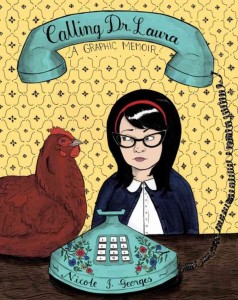Calling Dr. Laura: A Graphic Memoir is a really quick read, belying the book’s hefty physical weight.
As it’s the memoir of a lesbian cartoonist, there are inevitable parallels to Alison Bechdel’s work. However, Nicole J. Georges’s memoir isn’t as well crafted.
The black and white drawings are fine, but I’m not particularly drawn to them, nor are they doing anything inherently interesting or new. In terms of the story, we basically have Georges in her young adult life, as she remembers her mother’s disfunctional relationships with men, her stress-related health problems, her coming out, her first break-ups, and her discovery of a family secret. There’s enough going on for something interesting to happen, but the jumpiness of the plot lines is jarring. The internal revelations are also clumsy. Rather than allowing the story to reveal the inner conflict of the character, Georges at times relies on direct address to the audience (“Why didn’t I try to . . . For the following reasons).
After reading this, I can put together my own opinions of what I think is going on with Georges, but I’m not particularly convinced that I want to spend much time on it, especially since I don’t think I’ve gotten much encouragement from Georges to do so. She’s told me what she thinks her motivation is point blank.
As we end with the motivation pushing her towards inaction, the ending feels unfinished. No journeys come to an end. No new information will be gained past what we were told very early in the story.
It’s realistic, I suppose, but not necessarily compelling.

I’ve read a lot of memoir in my time (graphic and non). For me, the difference in powerful and not is not necessarily whether I relate to the character or whether I agree with their decisions, or whether they visibly grow as a person, but whether they’ve really done the work to show me a part of themselves–they have to have seen themselves in a non-superficial way first. (For superlative examples, see Maxine Hong Kingston, David B., Lidia Yuknavitch, Ryan Van Meter, etc.)
I just never get that feeling from Georges. The title of the memoir comes from the fact that she liked to listen to Dr. Laura (something her other gay, liberal friends didn’t understand) and that she once called into the show. I’ve read the whole memoir, but I don’t understand the appeal of the show to her either. I just know that she liked it, that she called in, that she cried. I didn’t.




